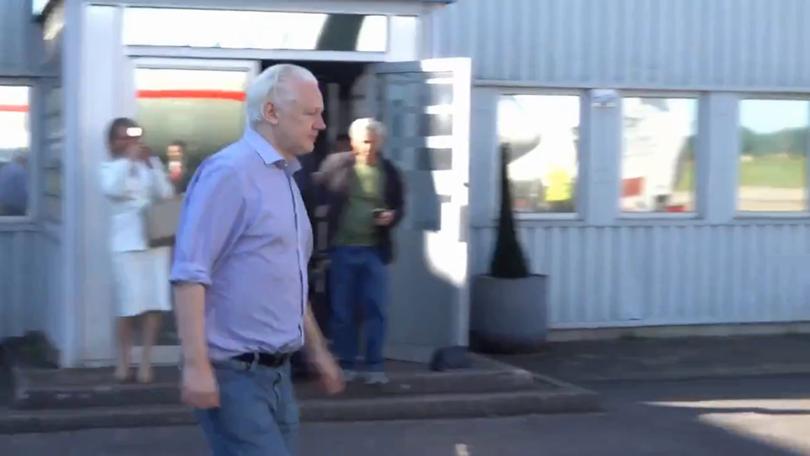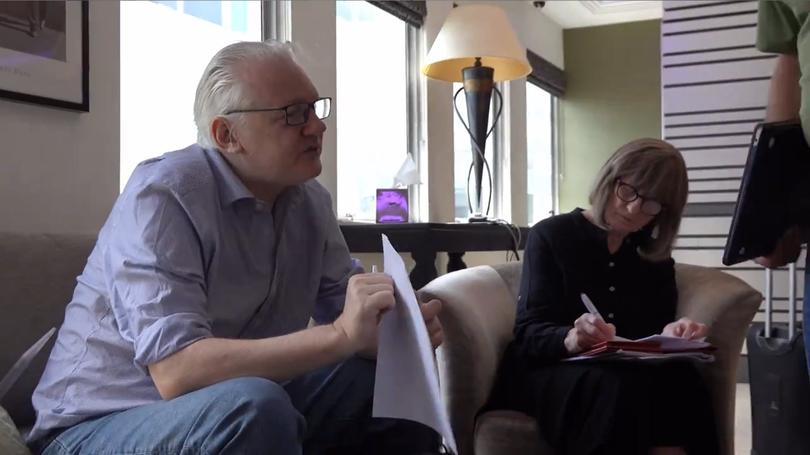WikiLeaks founder Julian Assange expected to plead guilty to felony charge
The tentative plea deal over Assange’s classified military document dumps likely ends a transatlantic tug-of-war spanning more than a decade.

Julian Assange, the founder of the anti-secrecy site WikiLeaks, has reached a tentative deal to plead guilty to one count of violating the Espionage Act for his role in obtaining and publishing classified military and diplomatic documents from 2009 to 2011, according to court filings.
The plea deal likely ends a long-running legal saga and a transatlantic tug-of-war that pitted national security against press freedom.
He is expected to be sentenced on Wednesday in the Northern Mariana Islands, according to a letter filed by the Justice Department in the remote US jurisdiction Monday evening. He will then return to his home country of Australia, the letter says, indicating he will be sentenced to the 62 months he has already spent behind bars in a London jail.
Sign up to The Nightly's newsletters.
Get the first look at the digital newspaper, curated daily stories and breaking headlines delivered to your inbox.
By continuing you agree to our Terms and Privacy Policy.A criminal information file alongside the letter says Assange “knowingly and unlawfully conspired” with Chelsea Manning to “receive and obtain documents … connected with the national defence” and “communicate” that information to “persons not entitled to receive” it. Manning, then a young Army intelligence analyst in Iraq, was convicted of violating the Espionage Act and other laws at a court-martial in 2013.
Assange, whose snow-white hair became recognisable worldwide, was a polarising figure. Supporters saw him as a courageous journalist whistleblower of government misdeeds, but his detractors saw a pompous self-promoter interested primarily in fame and oblivious to the harm his leaks might cause.
He burst into the American public consciousness in the 2010s when WikiLeaks began publishing a series of bombshell disclosures. They included hundreds of thousands of secret US military documents related to the wars in Afghanistan and Iraq and hundreds of thousands of confidential diplomatic cables that included candid and sometimes unflattering assessments by US diplomats of counterparts overseas - including foreign heads of state whose help was needed to counter-terrorism.
In 2016, he famously published emails that Russian government hackers had stolen from Democratic Party servers and that US authorities assessed were leaked by Moscow in an effort to disrupt the presidential election. He was not charged in connection with those documents.
Assange had eluded authorities for years by holing up in the Ecuadorean Embassy in London. He arrived in 2012 on the run from Swedish authorities, who were investigating him for sexual assault. That case was ultimately dropped, but in 2018 US officials indicted Assange under seal for computer hacking. Ecuador expelled Assange from the embassy the following year, accusing him of violating the terms of his asylum, and he was immediately arrested by British authorities on a US charge.
Ecuador, which took in Assange when he faced a Swedish rape investigation in 2012, said it was rescinding asylum because of his “discourteous and aggressive behaviour,” and for violating its terms.
Extradition efforts began soon after. But Assange’s attorneys argued that he would kill himself if ordered to face trial in the United States.
Meanwhile, the Justice Department under the Trump administration expanded the case against Assange to include 17 counts of violating the Espionage Act. Those charges, which make it a felony to gather, transmit or communicate without authorisation “national defence information” - generally understood to be classified information - immediately raised concerns from press freedom advocates who saw little distinction between WikiLeaks publishing leaked documents and traditional media reporting on matters of national security that often depend on leaks.
It marked the first time the US government was seeking to prosecute someone for publishing government secrets, civil liberties advocates say.
However, Assange was hardly an example of the traditional press. WikiLeaks’ Afghan War Logs disclosures were published with little vetting, for instance, to obscure the names of Afghan civilians who had provided information to the US military - an omission that dismayed human rights groups.
But First Amendment advocates saw the charges as a threat to press freedom nonetheless, opening the door to prosecutions of American media companies and journalists for work that, at least on the surface, bore similarities to what WikiLeaks did - publishing information related to national defence and intelligence.
Justice Department officials sought to make a distinction between Assange and traditional reporters. “Julian Assange is no journalist,” said John Demers, then the assistant attorney general for national security, when the charges were unsealed in 2019. He said Assange had engaged in “explicit solicitation of classified information.”
But press advocates said that distinction offered scant protection for journalists. Media lawyer Floyd Abrams said that Assange may be a “singularly unattractive defendant in a lot of ways,” but that the indictment “does raise deeply threatening First Amendment issues for journalists who cover national defence, intelligence activities and alike.”

“A plea deal would avert the worst-case scenario for press freedom,” said Jameel Jaffer, director of the Knight First Amendment Institute at Columbia University. “But,” he added, “Assange will have served five years in prison for activities that journalists engage in every day. This deal will cast a long shadow over the most important kinds of journalism, not just in this country but around the world.’’
It took nearly a decade from the diplomatic and military leaks themselves for the United States to prosecute Assange, amid debates over whether he should be charged with hacking or espionage and disagreement over whether the alleged crimes ran afoul of press freedom protections.
Manning, at her court-martial, expressed a desire to spark a national debate about the nation’s “obsession with killing and capturing people.” She was convicted of violating the Espionage Act, among other charges, and served almost seven years of a 35-year sentence before having her sentence commuted in 2017 by President Barack Obama.
Obama’s administration had passed on the Assange case, seeking to avoid the thorny First Amendment issue, but it never formally closed the investigation.
In negotiating the plea deal, the US government had already agreed that if Assange were convicted at trial in the United States, he could serve his sentence in his home country of Australia - one of several concessions made by the Justice Department in its five-year effort to extradite the WikiLeaks founder.
The United States promised Assange he would not face any charges that could trigger the death penalty, that he would not be automatically put in solitary confinement, and that he would receive mental health treatment. But Assange’s attorneys repeatedly argued that those promises were insufficient to prevent him from self-harm were he to be in US custody.
Assange’s health deteriorated during his long stay in London’s Belmarsh Prison, family members and his lawyer have told reporters. His brother, Gabriel Shipton, said in February that Assange was “going through (an) immense amount of suffering” and “his health is in a very delicate position,” according to The Independent.
According to two people familiar with the discussions, Justice Department officials have for months been discussing ways Assange could be held accountable without extradition to the United States. One possibility floated was that Assange would plead guilty remotely to a misdemeanour charge of mishandling classified information, while the organisation WikiLeaks would plead guilty to one of the felony espionage charges.
Aaron Schaffer contributed to this report.
© 2024 , The Washington Post
